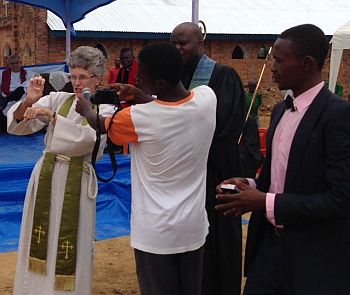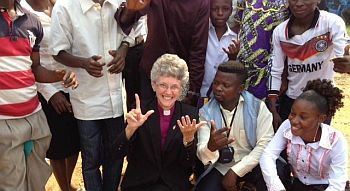
Deaf Encounters in the Congo
Bishop Peggy Johnson
I visited the Democratic Republic of the Congo during the summer of 2014 and had a brief glimpse at some Deaf schools during my 10-day blitz of many mission projects in the country.
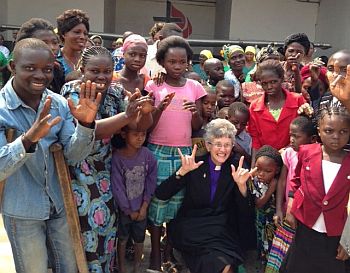
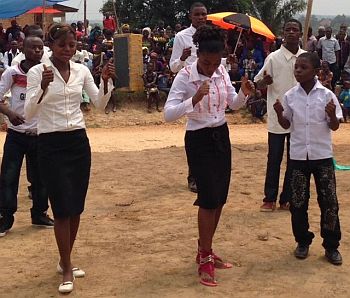
I am happy to say that the sign language that I encountered in the Congo was mostly American Sign Language. I surmise that this is because years ago American missionary Andrew Foster (a Baptist pastor who was Deaf himself) came to the Congo and brought his sign language with him. He established more than 30 Deaf schools on the continent of Africa before his untimely death in 1977. The Congo was one of his ministry sites.
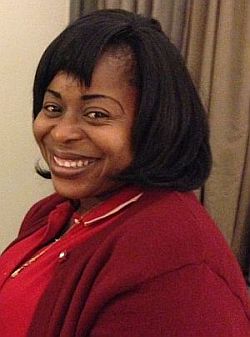 Four years ago I visited the Congo and met a family in the village of Wembo Nyama, who had a nine year-old Deaf daughter. They asked that I take her and send her to a school where she could get an education. There was no Deaf education available for her in her home town. As miracles happen, and they happen all the time in Deaf ministry, little Marie Awololo ended up going to a Deaf school in the city of Lubumbashi shortly after my encounter with her parents. I have been supporting her education ever since and she is blessed to have an uncle living in Lubumbashi and he allows Marie to live with his family. There is also a teacher who provides transportation for her each day to the Deaf school. Four years later Marie is fluent in sign language and has learned to read and write and has a full life. She even had a chance to visit her family last summer. I was unable to meet Marie while I was in the Congo this summer due to a family vacation but I had a chance to interview her teacher, who was hearing. Her teacher explained to me that the Deaf School in Lubumbashi was church related but not a United Methodist school. The classes go up to grade 10 and then there is an opportunity for students to do vocational training as well. Marie's teacher is very devoted to her and she also tutors her at times and purchases clothes and school supplies as needed.
Four years ago I visited the Congo and met a family in the village of Wembo Nyama, who had a nine year-old Deaf daughter. They asked that I take her and send her to a school where she could get an education. There was no Deaf education available for her in her home town. As miracles happen, and they happen all the time in Deaf ministry, little Marie Awololo ended up going to a Deaf school in the city of Lubumbashi shortly after my encounter with her parents. I have been supporting her education ever since and she is blessed to have an uncle living in Lubumbashi and he allows Marie to live with his family. There is also a teacher who provides transportation for her each day to the Deaf school. Four years later Marie is fluent in sign language and has learned to read and write and has a full life. She even had a chance to visit her family last summer. I was unable to meet Marie while I was in the Congo this summer due to a family vacation but I had a chance to interview her teacher, who was hearing. Her teacher explained to me that the Deaf School in Lubumbashi was church related but not a United Methodist school. The classes go up to grade 10 and then there is an opportunity for students to do vocational training as well. Marie's teacher is very devoted to her and she also tutors her at times and purchases clothes and school supplies as needed.
I met two other Deaf groups during my recent trip to the Congo. One was a group of friendly greeters when our small plane arrived in the city of Kamina. Rev. Willy Banza, who is a student at Perkins School of Theology in Dallas currently and is himself from the Congo, arranged for this group to meet me and I had a chance to talk with them briefly. The United Methodist Church gives some support to this school in Kamina. They had a speech prepared for me when I arrived and it was such a joy to talk with them.
The other Deaf group was in the city of Kindu. There was a large celebratory service on Sunday, August 17th at the United Methodist headquarters in Kindu. The East Congo Conference was dedicating a new conference center as well as a residence for the bishop at this event. Many churches came for the three and half hour celebration and among the many choirs that performed was a Deaf choir from a school and church from Kindu. The Deaf choir did a lovely song with a Deaf leader and a voice interpreter providing French translation for hearing people.
The sign language interpreter stood in the hot sun for the entire three and a half hours. I watched him intently. Most of his signs were ASL. The vocabulary had some variations. For example the word for "church" was a letter "e" instead of a letter "c." (The French word for "church" is "église" so it makes sense that their sign uses an "e.") The sign for "bishop" was a letter "e" ("évêque") done with the sign of the cross across the chest. I was enjoying watching his signs. Then for some reason someone who spoke English got up and started speaking English without French translation. I began to "feed" the interpreter the ASL words for the spoken English since he did not know English. Sometimes the person speaking at the pulpit would only speak French and not English. At those times the interpreter helped me to understand what was being said when other hearing English-only speaking people were left out. It was an amazing couple of hours. I had the chance to give a short talk using ASL during the service. Also I talked with the Deaf group later and they told me they walked a long way to come to the service to see the "Bishop who loves the Deaf." The local bishop had recruited them ahead of time as a special surprise for me.
From what I can see these schools are small and struggling and in need of funding and prayers. I wish we could find a way to visit them in the future or at least support Rev. Willy Banza's efforts at the Kamina Deaf School in the future.
